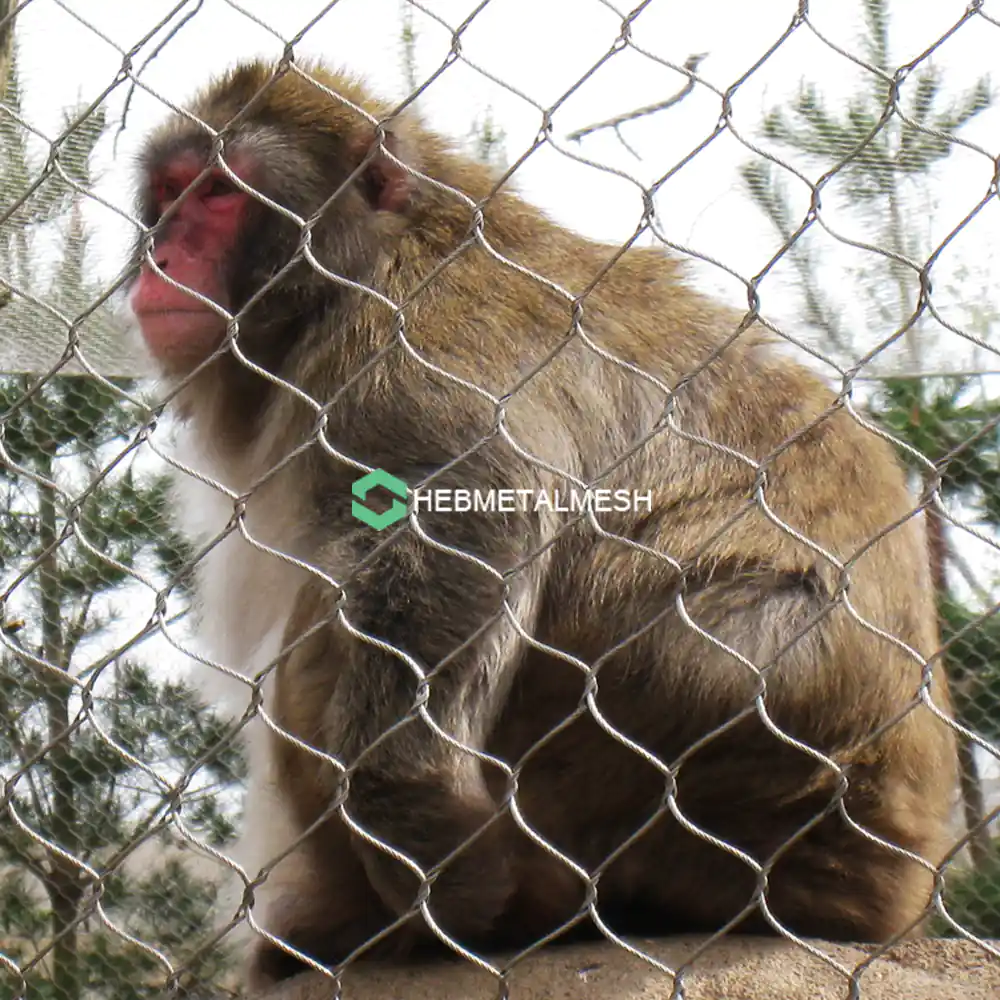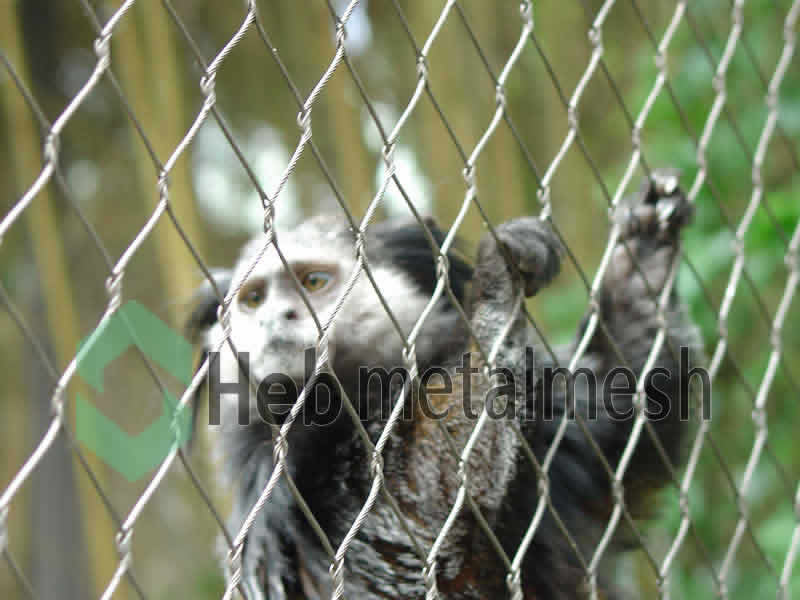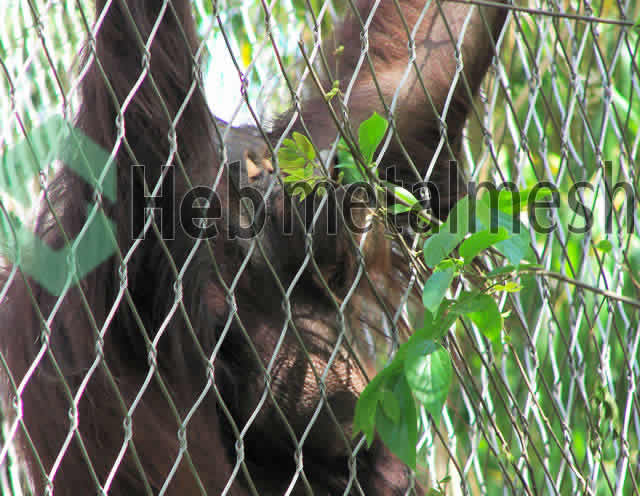Introduction to Monkey Habitats
Monkey habitats are specialized environments designed to meet the physical and psychological needs of these highly intelligent and social animals. Creating a suitable habitat is crucial for their well-being, as it directly influences their health, behavior, and overall quality of life. In the wild, monkeys thrive in diverse ecosystems ranging from lush rainforests to arid savannas, each contributing unique elements that facilitate their natural behaviors. When replicating these conditions in a controlled setting, several factors must be taken into consideration.
A key aspect of designing effective monkey habitats is ensuring that they provide safety and security. This can be achieved through proper fencing and netting solutions that prevent escapes while allowing the monkeys to engage in natural climbing and foraging behaviors. The use of wire rope mesh has become increasingly popular among wildlife sanctuaries and zoos, as it offers a flexible and durable solution to encase these environments. This type of mesh not only serves as a physical barrier but also promotes ventilation and visibility, which are essential for the mental stimulation of animals living in captivity.
Additional elements to consider include varying the terrain to mimic the natural landscapes experienced by monkeys in their wild counterparts. Incorporating structures such as trees, platforms, and climbing opportunities, within the monkey habitats encourages exercise and social interaction. Moreover, providing enrichment through toys, food puzzles, and social groupings helps foster cognitive development. Therefore, through thoughtful consideration of fencing and netting options, including the use of wire rope mesh, professionals can create enriching habitats that meet the diverse needs of monkeys, ultimately enhancing their overall welfare.
Key Features of Monkey Habitats
Designing effective monkey habitats requires a thorough understanding of the specific needs of these primates in captivity. Monkeys are naturally active and social creatures, necessitating environments that cater to their physical and social well-being. One of the primary features to consider is the provision of ample climbing space. Monkeys thrive in vertical environments that allow them to explore and exhibit their innate climbing behaviors. This can be achieved through tall structures and platforms within their enclosures, promoting physical activity and stimulation.
Another crucial aspect of monkey habitats is the need for social interaction. Many monkey species are highly social and live in tight-knit communities in the wild. Therefore, enclosures should be designed to accommodate multiple individuals, enabling them to interact, groom, and engage in social behaviors that are essential for their mental health. This not only ensures their well-being but also increases the educational value for visitors observing these intelligent animals.
Safety is a paramount concern when creating monkey habitats. The design must incorporate secure fencing to protect the animals from potential threats, both external and internal. Wire rope mesh is often recommended for this purpose, as it offers durability, visibility, and the ability to withstand wear from active monkeys. The mesh must be properly sized to prevent escape while ensuring the monkeys can interact with the environment and their keepers safely. In assessing monkey habitats, it is critical to balance these needs while considering the materials selected for construction. Investing in high-quality fencing materials, such as wire rope mesh, can contribute significantly to the overall safety and functionality of the habitat.
Why Choose Wire Rope Mesh for Monkey Habitats

The selection of materials for constructing monkey habitats is pivotal in ensuring the safety and well-being of these animals. Wire rope mesh has emerged as a favored choice among wildlife facilities for several compelling reasons. One of the most significant advantages of using wire rope mesh is its exceptional strength and durability. Unlike traditional fencing options that may easily succumb to the wear and tear imposed by active monkeys, wire rope mesh can endure significant stresses without compromising structural integrity.
This material demonstrates a high tensile strength, allowing it to withstand the vigorous movements and climbing tendencies of monkeys. The dynamic nature of these animals necessitates a robust environment, and wire rope mesh provides a secure enclosure that promotes safe interaction. It is specifically designed to resist forces that could potentially lead to breaches in containment, thereby minimizing risks associated with escape or injury.
Another key benefit of wire rope mesh is its versatility. This type of fencing can be customized to suit various habitat designs, ensuring that it meets the specific requirements necessary for different monkey species. The mesh’s flexibility allows for expansive enclosures that mimic natural settings, encouraging exploration and physical activity vital for the monkeys’ well-being. Additionally, wire rope mesh facilitates visibility, enabling caretakers and visitors to observe the monkeys without disrupting their environment.
Furthermore, maintenance and longevity stand out as additional advantages of adopting wire rope mesh in monkey habitats. The material is resistant to corrosion and environmental factors, which often lead to degradation of traditional fencing solutions. This means that over time, wire rope mesh not only remains a secure option but also sustains aesthetic appeal while requiring less frequent replacements or repairs.
Safety Benefits of Wire Rope Mesh
Wire rope mesh has emerged as a popular choice for enclosures in monkey habitats, primarily due to its safety features that ensure both the well-being of the monkeys and the protection of surrounding environments. The inherent design of wire rope mesh provides a robust barrier that effectively prevents monkeys from escaping, thereby reducing potential interactions with human populations and other wildlife. The flexibility and strength of the mesh allow for a secure yet spacious environment where monkeys can exhibit natural behaviors without the risk of injury or escape.
Moreover, the open structure of wire rope mesh poses a significant advantage. It deters potential predators, enabling a safer atmosphere for monkeys. This visibility allows zookeepers and researchers to monitor the monkeys without causing disturbance or stress to the animals. The design further ensures that predators, which might otherwise approach a more traditional enclosure, are unable to gain access, thereby creating a safer habitat for the primates residing within.
Real-life applications of wire rope mesh in monkey habitats have demonstrated its effectiveness in enhancing safety. Many zoos and wildlife reserves have successfully implemented wire rope mesh systems, yielding low incidents of escape and minimal risks related to predator encounters. In one notable case, a wildlife sanctuary faced challenges with traditional fencing that did not prevent escapes. By replacing it with wire rope mesh, they reported a dramatic decrease in escape incidents. Additionally, the minimized risk of accidents, such as entanglement or injuries sustained during interactions with traditional barriers, further solidifies wire rope mesh as a practical solution. Its strength and flexibility not only contribute to safety but also promote an enriching environment for monkeys, allowing them to thrive.
Comparing Wire Rope Mesh to Other Fencing Materials
When selecting the appropriate fencing for monkey habitats, it is crucial to compare the various materials available, notably wire rope mesh, chain-link, and barbed wire. Each of these options has distinct characteristics that impact their practicality and effectiveness in a setting designed to accommodate primates.
Wire rope mesh stands out due to its unique combination of strength and flexibility. Unlike chain-link fencing, which is typically rigid and may not provide the same level of security, wire rope mesh offers a more adaptable solution, allowing for variations in habitat design. This flexibility is essential in accommodating the dynamic nature of monkey habitats, where climbing and swinging are natural behaviors. Maintenance is another critical consideration; wire rope mesh is generally low-maintenance, as its robust materials resist corrosion and wear over time, in contrast to chain-link, which may require periodic repairs due to rusting or structural fatigue.
Cost is often at the forefront of decision-making when selecting fencing materials. While wire rope mesh may initially appear more expensive than barbed wire or chain-link options, its longevity and maintenance savings can justify the investment over time, resulting in reduced overall costs for caretakers. Furthermore, the visibility provided by wire rope mesh promotes an open environment, enhancing the observation experience for visitors and giving primates a feeling of space, unlike the more enclosed appearance of alternatively used materials.
In terms of installation, wire rope mesh can be more complex due to its specific requirements and need for expert setup. However, the security and enhancement of the habitat’s aesthetic appeal far outweigh this initial challenge. Each fencing material has strengths and weaknesses, but wire rope mesh emerges as a strong candidate for ensuring safe and suitable conditions within monkey habitats.
Best Wire Rope Mesh Products for Monkey Habitats
When it comes to selecting wire rope mesh for monkey habitats, it is essential to consider not only the durability and strength of the materials used but also the specific needs of various monkey species. Here, we recommend several wire rope mesh products that stand out for their exceptional quality and suitability for creating secure and comfortable environments for monkeys.
One of the top choices is the VersaMesh Wire Rope Mesh, known for its high tensile strength and flexibility. This product is crafted from stainless steel, offering resistance against environmental factors like rust and corrosion. With an opening size that balances visibility and safety, VersaMesh is ideal for larger primate species such as macaques and capuchins, allowing them to explore their habitat without the risk of escape.
Another excellent option is the PrimateSafe Wire Mesh, designed specifically for primate exhibits. This mesh product features a smaller aperture size suitable for smaller monkey species like tamarins and marmosets. The unique construction of PrimateSafe provides enhanced strength while maintaining a lightweight profile, making it easy to install. Additionally, this product has been treated to reduce sharp edges, ensuring the safety of the monkeys as they interact with their surroundings.
For those looking for customization, the TotalGuard Custom Mesh offers tailored solutions to fit specific habitat designs and species needs. This flexible option allows zoos and sanctuaries to specify mesh dimensions and material thickness. The TotalGuard product line is particularly beneficial for environments requiring a balance between security and visibility, making it suitable for various monkey species.
In selecting the appropriate wire rope mesh for monkey habitats, it is crucial to analyze specifications and features thoroughly. Understanding the unique needs of different monkey species will assist in making informed decisions, ultimately contributing to the well-being of the animals in their habitats.
Installation Tips for Wire Rope Mesh in Monkey Habitats
Effectively installing wire rope mesh in monkey habitats is crucial for ensuring the safety and well-being of these animals while also providing a durable and secure enclosure. A systematic approach to the installation process not only enhances the structural integrity of the habitat but also promotes its longevity. Here are some essential tips for a successful installation.
First and foremost, accurate measurements are vital. Before purchasing the wire rope mesh, carefully measure the enclosure area where it will be installed. This includes assessing the height, width, and any irregular shapes in the area. Taking precise measurements will help you determine the amount of material needed, thus minimizing waste and ensuring that the mesh fits snugly within the designated space.
Preparation of the site is the next step in the installation process. Clear the area of any debris, sharp objects, or potential hazards that could harm the monkeys or the installation team. It is also advisable to inspect the existing structure for any damage or weaknesses that should be repaired prior to installing the wire rope mesh. Ensure that any necessary tools and safety equipment are readily available to facilitate a smooth installation.
When securing the wire rope mesh, utilize quality fasteners that are suitable for the specific environment of monkey habitats. It is important to ensure that the mesh is taut and properly anchored to avoid any sagging, which could create openings for escape or intrusion. Regularly check that the mesh remains secure over time, as environmental shifts may require periodic adjustments.
Lastly, prioritize the safety of the monkeys during and after the installation. Minimize disturbances by planning the installation during quieter times. Following these practical tips will help create a secure and safe environment for monkeys, ensuring they thrive in their habitat.
Maintaining Wire Rope Mesh in Outdoor Environments
Maintaining wire rope mesh in outdoor monkey habitats is crucial for ensuring both the safety of the animals and the longevity of the mesh itself. Wire rope mesh is designed to withstand various environmental elements, but regular maintenance is essential to prolong its lifespan and effectiveness. A systematic approach to maintenance not only enhances the durability of the mesh but also helps maintain optimal habitat conditions for the monkeys.
First, it is important to conduct routine inspections of the wire rope mesh. These inspections should include checking for any signs of wear or damage, such as fraying, rust, or loose connections. Early detection of potential issues can prevent larger problems down the line, reducing the risk of injury to the monkeys and ensuring the integrity of the habitat. It is advisable to schedule inspections at least once every few months, or more frequently in areas with harsh weather conditions that may accelerate wear and tear.
Another vital aspect of maintenance is cleaning the wire rope mesh. Environmental factors such as dirt, vegetation, and even waste can accumulate over time, which may impact both the aesthetics and functionality of the mesh. Regular cleaning with non-toxic agents is recommended to remove debris and algae, ensuring the mesh remains free of obstructions. Soft brushes can effectively aid in cleaning without damaging the wire.
When repairs are needed, it is crucial to address them promptly. This may involve re-tightening loose wires or replacing sections of the mesh that exhibit significant damage. Utilizing high-quality materials for repairs is essential to maintain compatibility and functionality with the existing wire rope mesh. By adhering to these maintenance guidelines, caretakers can ensure that the wire rope mesh continues to provide a safe and engaging environment for monkeys, ultimately contributing to their well-being in captivity.
Conclusion and Final Thoughts
In selecting the most appropriate wire rope mesh for monkey habitats, several critical factors must be taken into account to ensure both the safety of the primates and the durability of the installation. Throughout this discussion, we have emphasized the importance of understanding the specific needs of the species you are housing. Different monkeys have varying behavioral traits and physical requirements, which should guide your choice of mesh. Materials that can withstand the unique challenges presented by an active monkey population are essential for maintaining a secure and enriching environment.
Moreover, the design and construction of the wire rope mesh play a pivotal role in safeguarding the wellbeing of the monkeys. Considerations such as the tensile strength, mesh size, and environmental impact are vital. By prioritizing sustainability, you can contribute positively to the ecological balance while providing a safe habitat for the monkeys. The integration of various mesh types, based on specific habitat requirements, reflects a thoughtful approach that will promote health and safety for the animals.
Ultimately, the selection of wire rope mesh is more than just a practical decision; it is an investment in the future of the habitat and the animals it shelters. By choosing robust and sustainable materials, you ensure that the monkey habitats are not only secure but also conducive to the monkeys’ natural behaviors. We urge readers to explore recommended products that meet these specifications while adhering to best practices in habitat design. When you passionately commit to creating a supportive environment for these remarkable beings, you contribute to their overall quality of life and the educational value such habitats provide to enthusiasts and observers alike.


